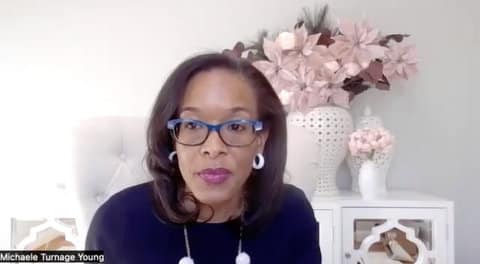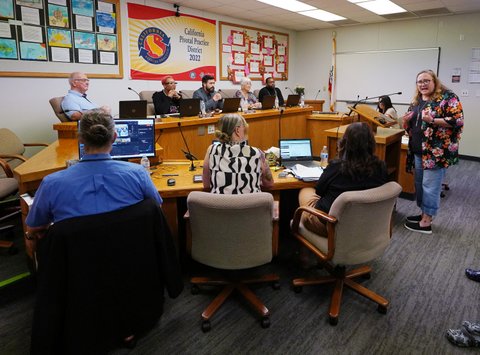
30 Jan Civil Rights in Education Come Under Threat

“The pathways to leadership in our country [must] be visibly open to people from all corners of our society,” said Michelle Turnage Young, senior counsel at the Legal Defense Fund. (Screenshot captured by Natasha Kaye / The CC Pulse)
By Natasha Kaye
The future of education and civil rights for marginalized students may soon be in jeopardy, a panel of experts warned Jan. 18.
Their warning came during a media briefing co-sponsored by Ethnic Media Services and the Leadership Conference Education Fund discussing the landscape of education and civil rights across the U.S. in the year ahead.
The panel of experts and leaders in civil rights discussed the Biden administration’s student-debt relief plan, judicial efforts to end affirmative action, and the state of childcare three years after the onset of the COVID-19 pandemic.
Genevieve “Genzie” Bonadies Torres, an associate director at the Lawyers Committee for Civil Rights Under Law, discussed the challenges facing the Biden administration’s student loan debt relief plan, which has since been blocked by the courts. Bonadies Torres said targeted relief from the plan would assist more than 40 million Americans, especially Black and Latino families, who have been disproportionately negatively affected by the COVID-19 pandemic.
>>>Read: Student Debt Fuels Racial Wealth Gap, Advocates Say
Currently, two lawsuits challenging the legality of the debt forgiveness act are scheduled to be heard by the U.S. Supreme Court in coming months. Defenders of the plan like Bonadies Torres argue it “faithfully adheres” to the guidelines of the Higher Education Relief Opportunities for Students Act of 2003.
“The HEROES Act allows the secretary to take action in a national emergency — in this case, COVID-19 — to make sure affected borrowers are not placed in a worse place financially because of that emergency,” said Bonadies Torres.
Michelle Turnage Young, senior counsel at the Legal Defense Fund, discussed yet another challenge affecting minorities in higher education: the state of affirmative action in university admissions.
It is legal for universities to consider race as a factor in admissions. However, two lawsuits that are awaiting a decision from the Supreme Court — one against Harvard University and one against the University of North Carolina — have challenged this precedent. The petitioner in both cases, Students for Fair Admissions, claims that considering race as an admissions factor violates constitutional protections under the Equal Protection Clause of the 14th Amendment and Title VI of the Civil Rights Act of 1964. But SFFA did not present any evidence of racial discrimination in the admissions process during oral arguments heard by the Supreme Court last October, according to Turnage Young.
“It continues to be of the utmost importance to our multi-racial democracy that the pathways to leadership in our country be visibly open to people from all corners of our society,” said Turnage Young.
Recent measures from legislators to restrict schools’ diversity and inclusion efforts have resulted in a wave of censorship in classrooms. Among these efforts have been measures to ban teaching critical race theory, the increasingly prevalent academic framework that emphasizes the far-reaching implications systemic racism has for people of color in the United States.
“It’s important to know that the so-called anti-CRT movement has never really been directly about eliminating the academic legal framework known as critical race theory,” said Morgan Craven, a national director at the Intercultural Development Research Association. “Fundamentally, it has been about censorship and control over our collective history and narratives.”
Craven warned of upcoming policies on local, state, and federal levels designed to target racial minorities and LGBTQ youth. She said that the day before the briefing the lieutenant governor of Texas reaffirmed threats targeting professors who teach critical race theory.
AJ Link, a policy analyst from the Autistic Self Advocacy Network, provided a summary of a suite of bills endorsed by TLC and ASAN designed to promote the “eight principles of safe, healthy, and inclusive schools.” The bills include the Protecting our Students in Schools Act, which prohibits the use of corporal punishment in schools, and the Safe Schools Improvement Act, which establishes anti-bullying policies in K-12 schools, according to Link.
Whitney Pesek from the National Women’s Law Center discussed the lack of affordable and sustainable childcare entering year four of a pandemic that “pressure-tested” the early childhood care and education system. She said that women of color make up a “significant portion” of the already underpaid early childcare workforce, making affordable childcare a gender and racial justice issue. This combined with the rising cost of childcare exacerbates the strain on marginalized families who have historically fewer financial safety nets.
By and large, each panelist agreed that the landscape of education rights for marginalized Americans could soon see massive changes to the admissions, protections and financial components essential to receiving a quality education.






No Comments